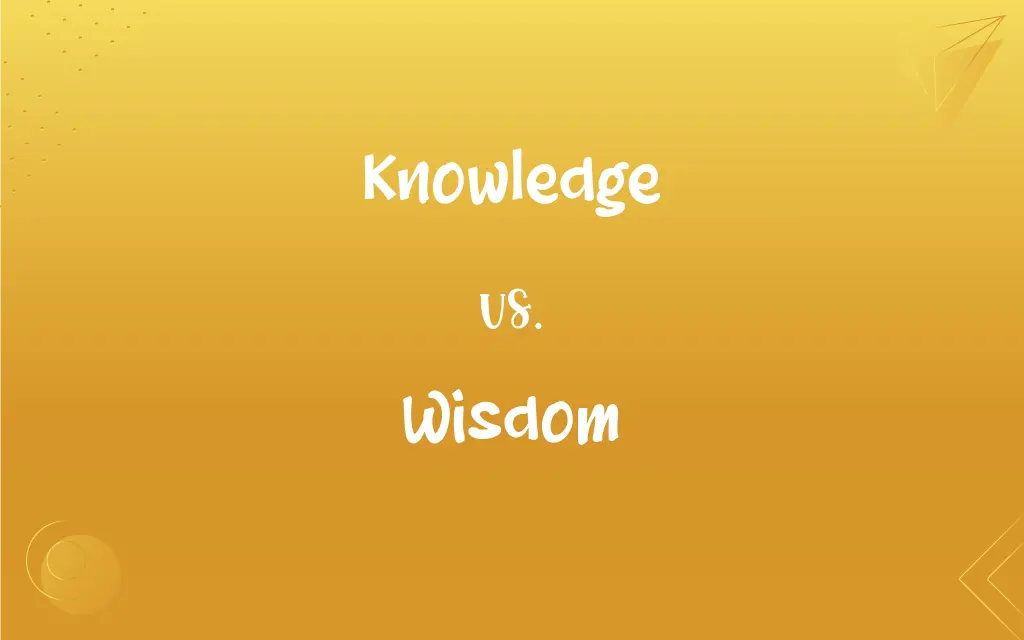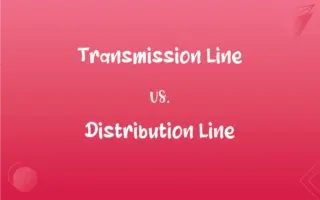Knowledge vs. Wisdom: What's the Difference?
Edited by Janet White || By Harlon Moss || Updated on October 27, 2023
Knowledge is the collection of facts, information, and skills, while wisdom is the insightful application of knowledge based on experience and judgment.

Key Differences
Knowledge is often defined as the collection of information, facts, and skills that one acquires through experience, education, or by being taught. Wisdom, on the other hand, is the ability to use that knowledge effectively and judiciously in various life situations. While knowledge can be seen as a library of information stored in one's mind, wisdom is more like the librarian who knows how to organize, interpret, and apply that information in the most beneficial way.
Knowledge is knowing a vast number of facts or having a deep understanding of specific subject areas. Wisdom, however, goes beyond mere knowing; it involves discernment and the capacity to make sound judgments. For instance, one might have extensive knowledge about human psychology (knowledge), but it takes wisdom to apply that knowledge in a way that is compassionate and effective when dealing with people's emotions and behaviors.
The acquisition of knowledge is a process that can be measured, such as earning degrees or mastering a skill through practice. Wisdom, conversely, is less quantifiable and often develops over time through lived experiences and reflection. Knowledge might tell a person how a machine works and how to operate it; wisdom will guide them to understand when and why using that machine is appropriate or ethical.
Knowledge can be shared and transferred relatively easily; it's common in textbooks, documentaries, and lectures. Wisdom, however, is deeply personal and often hard to convey. It's the result of a person's unique experiences, values, and contemplation. Knowledge can teach someone the laws of physics, but wisdom is what enables an engineer to innovate and design structures that benefit society.
In summary, knowledge and wisdom, while related, are distinct concepts. Knowledge is the foundation, the raw data and information one gathers. Wisdom is the sophisticated upper structure, the ability to apply that knowledge in ways that are meaningful, beneficial, and considerate of broader implications. Both are invaluable, but they play different roles in personal growth and understanding.
ADVERTISEMENT
Comparison Chart
Definition
Study of structure of organisms
Study of functions of living parts
Method
Dissection, observation
Experiments, measurements
Objective
Identify and describe parts
Explain how parts work
Subfields
Histology, embryology
Neurophysiology, cardiovascular phys.
Relation
Provides form
Explains function
ADVERTISEMENT
Knowledge and Wisdom Definitions
Knowledge
Branch of Science.
Anatomy is a fundamental subject in medical education.
Wisdom
Science of Life Processes.
Physiology is crucial in understanding health.
Knowledge
Body Part Description.
The anatomy of the heart is complex.
Wisdom
Biophysical Processes.
Exercise physiology examines muscle responses.
Knowledge
Morphology.
The anatomy of birds is adapted for flight.
Wisdom
Cellular Functions.
Plant physiology includes photosynthesis mechanisms.
Knowledge
Physical Structure.
They studied the anatomy of the human brain.
Wisdom
Biological Function.
Physiology explains how the heart beats.
Knowledge
Dissection Study.
In class, we explored the anatomy of a frog.
Wisdom
Organ System Working.
Renal physiology involves studying kidney functions.
Knowledge
The state or fact of knowing
Humans naturally aspire to knowledge.
Wisdom
The ability to discern or judge what is true, right, or lasting; insight.
FAQs
Do anatomy studies involve living specimens?
Usually not, it primarily involves dissection of deceased specimens.
Are anatomy and physiology always studied together?
Often, as they complement each other, but can be separate.
Can physiology explain diseases?
Yes, by showing how normal functions are disrupted.
Is dissection essential in anatomy?
Traditionally yes, but alternatives like 3D models exist.
Can anatomy and physiology predict health outcomes?
To some extent, by understanding structure and function.
Is physiology limited to internal functions?
No, it also involves external functions like muscle movement.
Can physiology be observed directly?
Often indirectly, through tests and measurements.
Does anatomy require a microscope?
For microanatomy or histology, yes.
Can technology advance physiology?
Absolutely, through new techniques and equipment.
Are anatomical terms universal?
Generally, they follow standardized international terminology.
Is anatomy just about human bodies?
No, it can also involve animals and other organisms.
Does physiology require knowledge of chemistry?
Yes, understanding biochemical processes is important.
Can anatomy change over time?
Generally not, except in cases like evolution or development.
Is physiology only about human bodies?
No, it also includes animal and plant physiology.
Are there specialized fields in anatomy?
Yes, like neuroanatomy and comparative anatomy.
Does physiology include mental functions?
Yes, in fields like neurophysiology.
Is anatomy foundational to surgery?
Yes, understanding anatomy is crucial for surgeons.
Does physiology change with age?
Yes, as bodily functions can change over a person’s lifetime.
Is physiology a dynamic field?
Yes, as it involves ongoing functions and changes.
Can anatomy be affected by diseases?
Diseases can alter anatomical structures.
About Author
Written by
Harlon MossHarlon is a seasoned quality moderator and accomplished content writer for Difference Wiki. An alumnus of the prestigious University of California, he earned his degree in Computer Science. Leveraging his academic background, Harlon brings a meticulous and informed perspective to his work, ensuring content accuracy and excellence.
Edited by
Janet WhiteJanet White has been an esteemed writer and blogger for Difference Wiki. Holding a Master's degree in Science and Medical Journalism from the prestigious Boston University, she has consistently demonstrated her expertise and passion for her field. When she's not immersed in her work, Janet relishes her time exercising, delving into a good book, and cherishing moments with friends and family.































































